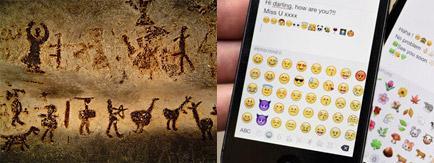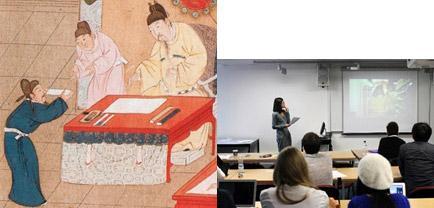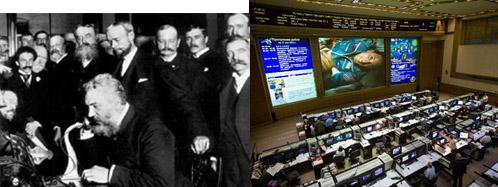The human need to communicate is constant. From the earliest gestures, symbols, first language and writing, to today's digital torrents, people have always felt the need to connect, share, and reach out to each other. Huawei's vision is to build a Better Connected World, to enrich lives through communications.
36,000 years ago, in the Chauvet Cave in France, Palaeolithic humans used hematite and charcoal to draw images of animals, and record the spectacle of a volcanic eruption. Today, we select emojis to compose and communicate our emotions. The technology may change, but not even the profoundest gulfs of time can alter the impulse to connect.

Connection can be a spoken exchange; it can be the transmission of knowledge; or the spread of culture. In the past, the urge to record and communicate drove us to painstakingly hew wooden tablets, or use the skins of wild beasts to make parchment. Now, art students from remote corners of the world can travel by video to the banks of the Seine, take a virtual tour of the Louvre, and hear lecturers expounding on the mysterious smile of the Mona Lisa.

Connection is an expression of love. Years ago, youths from the village over the hill would write long letters avowing their love for girls they had only glimpsed a few times. And how many of those letters actually made it into the hands of the intended recipients? Today, our loved ones are only a video call away, and we do not have to miss a moment with them. Over a video connection, smiles still draw an instinctive smile in reply, and tears can be shared.

Connection is a way to work better, together. In the past, the fastest pony express would still take days to arrive. For the most part, we had to solve our own problems. Today, a Silicon Valley scientist can consult seamlessly with a research team in Dubai and a customer in KSA. All it takes is a broadband connection.

Connection is an exploration beyond the boundaries of physics and physiology. Little more than 100 years ago, the world was stunned when the first telephone call ended the tyranny of geography. Today, astronauts speak to mission command from the reaches of space.

Huawei believes that connection makes for a better world. Our sons and daughters may travel far from home, but connection transmits their love and care back to the parents to whom they owe so much. Students have always buried themselves in textbooks, but connection opens up new worlds for them to learn. Our sweetheart may not be by our side, but connection can carry love across the miles and down the years.
In the future, a Better Connected World will bring us a different kind of experience. It will revolutionize every part of our lives, our economy, our communities.
India, 2042. Sanjay, nine years old, suffers from a rare PNET cancer. The tumor has hemorrhaged, and must be removed now if he is to survive. But in his home town, there is no surgeon qualified to perform the operation. The hospital log on to a global AI medical network, and finds a brain specialist in London who is ready to perform remote surgery.
High-definition video cameras and MRI equipment capture every detail of Sanjay's condition, and transmit it in real time to the London hospital. The surgeon takes control of a multipurpose computer-assisted surgical robot, and begins the operation - the network reproducing every sensation 100%, so that her fingers feel just as if she were right there in the operating theater.
The operation is a success. For young Sanjay, this is much more important than the technology and governance that allowed it to happen. In fact, the UN resolution to pool global medical resources was passed before he was born. But it has already saved countless lives in underdeveloped areas.
China, 2035.Liu Wei climbs into his new driverless vehicle. The car has no indicator lights at the front or back - but of course, the roads are fully automated now, so who needs indicators? Liu tells the car where he wants to go, and the onboard navigation system connects to city transport control, to check for traffic jams. The roads are clear, and the computer displays a precise estimated time of arrival. On the way, Liu schedules his next few days of work, with music on in the background. Every second of the journey, his car is making digital "handshakes" with hundreds of other vehicles, learning their speed, route, whether they are about to change lane. This is how the roads have been made safe: today there are almost no injuries or deaths from traffic accidents.
The central transport network is constantly collecting data from tens of thousands of cars on the road, analyzing traffic flows, and delivering optimum route advice. In fact, this data is now being used to help plan where new roads should be built. As a result, even for residents of Liu's packed city, "I was stuck in traffic" is no longer an excuse.
USA, 2028. Every second of the day, internet users all over the world upload millions of video footage. John is developing a new search engine that will recognize and understand the people, objects, and situations in those videos. An AI engine with machine learning capabilities is reaching out to data centers all over the world, collecting the archives of HD video that they contain. John is confident that the new engine will help users find the exact video clips that they want. More important, though, will be its analytic capabilities. It will tell fashion designers what colors and cuts young people are favoring. It will show toy makers the latest games. And it will help governments understand what their citizens think of the latest public projects.
In the future, we believe that connectivity will be as ubiquitous as the air that we breathe. Connections between people, person to device, and thing-to-thing, will feed into real-time intelligent analysis and communications. They will help satisfy our every economic need. Using these connections will feel as natural to us as breathing. In fact, we will barely be aware that they exist. Our focus will naturally lie on the applications and services that connectivity enables.
From the deep past of Chauvet, to real-time video links; from messages that echo down the millennia to data that flashes across continents, technology is enabling connection and satisfying a basic human need. Welcome to the Better Connected World.